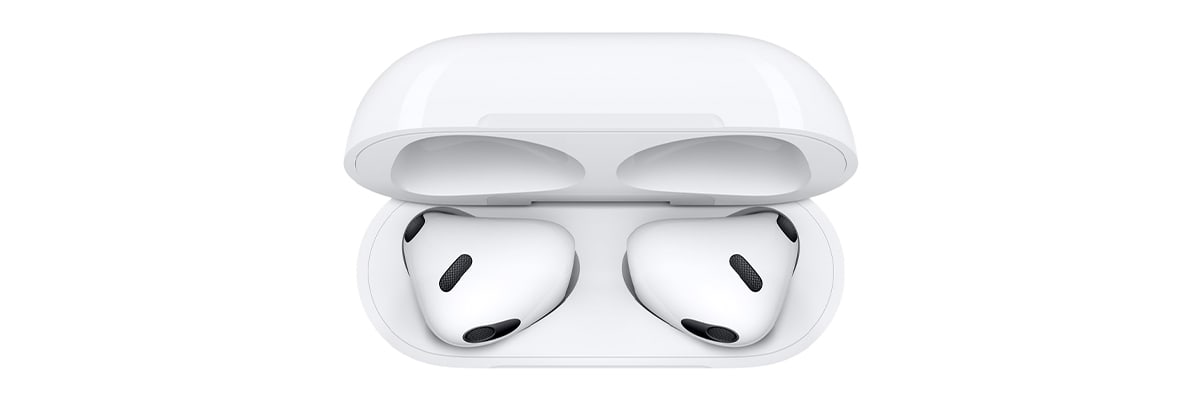
Return navigate_next
Apple AirPods 3 Versus Apple AirPods Pro
February 8, 2022 *
The launch of any new Apple product invariably raises questions surrounding whether people should upgrade. From the newest iPhone to the latest generation of Apple Watch, the same also applies to the manufacturer’s now-ubiquitous wireless earbuds. Apple’s latest incarnation, its third-generation AirPods, arrived late last year.
They’re a marked improvement over their predecessor, the still-available second-generation model, albeit currently at a $50 premium. However, they’re also $70 cheaper than the existing flagship – AirPods Pro. Apple’s AirPods Pro earbuds are now well over two years old. So, are they still the model to buy? Or has a new generation of standard AirPods seen them improve to the point where they’re now the must-have option?
Differences Between AirPods and AirPods Pro
Looking back to the first generation of Apple AirPods, they paled in comparison to the subsequent and costlier Pro model. Second-generation AirPods caught up somewhat, but only to an extent.

The AirPods Pro have always boasted premium features like noise cancellation, waterproofing, adaptive EQ, support for spatial audio, and more. These are all features previously lacking from the cheaper, standard AirPods.
Fast-forward to today, however, and the Apple AirPods 3 have almost entirely caught up with their much more expensive stablemate. While they still lack customizable ear tips and a couple of other Pro-exclusive selling points, the third-generation AirPods are streets ahead of the original entry-level model.
Apple AirPods Pro Features
One of the biggest reasons for still opting for AirPods Pro over AirPods 3 is their active noise canceling. While the cheaper non-Pro model now gets passive noise cancellation, it lacks an active mode.
That may not seem like much, but it’s an important distinction, especially where noise-canceling abilities are important. Unfortunately, despite being two years newer, the more basic noise-canceling tech in the latest AirPods 3 is still some way behind that in the costlier Pro model.
Then there are the Pro’s ear tips. Some people simply don’t get along with the standard AirPods, finding that they’re a struggle to wear. Meanwhile, AirPods Pro, with their customizable silicone tips, continue to represent one of the most comfortable and easy-to-wear pairs of earbuds on today’s market.

Apple AirPods 3 Features
So, two years on, how have the third-generation entry-level Apple AirPods improved over their Pro-tier counterpart? For the most part, they’ve simply caught up in areas where they were once lacking. And at $179 versus $249, that’s not to be sniffed at.
Where the third-generation AirPods really excel, however, is in terms of battery life. AirPods 3 get six hours of listening time on a single charge. The costlier AirPods Pro, by contrast, manages barely four hours. Ultimately, that’s down to the fact that they boast the power-hungry active noise canceling functionality that the cheaper AirPods 3 lack.
Furthermore, it’s worth noting that even six hours is still well behind the ten or more promised by the likes of Samsung’s Galaxy Buds+. That said, with extra power stored in their cases, both the AirPods 3 and AirPods Pro offer a further 24 hours of listening, topped up as required. The case provided with Samsung’s $149 Galaxy Buds+, on the other hand, grants less than half of that amount.
AirPods 3 or AirPods Pro: Which to Buy?
Where a customizable fit and active noise cancellation are must-haves, Apple’s AirPods Pro remain the better option. Yet, where neither of these points is overly important, the newer AirPods 3 are now just as capable. Especially at under $180, they offer excellent value, particularly when compared directly to the $249 AirPods Pro.

Be that as it may, with the second generation of AirPods Pro now incoming, picking up the outgoing flagship option at a discount could be possible. As a result, the AirPods Pro would again be the option to go for.
Protect Your AirPods With Upsie
Whichever model you choose, be sure to protect your Apple AirPods with an extended headphone warranty from Upsie. Upsie warranties cost up to 70 percent less than warranties sold by Apple and retailers such as Walmart and Best Buy.
With Upsie, customers gain access to comprehensive protection against manufacturing defects, mechanical faults, and accidents. With that, their AirPods are further protected against drops, cracks, and liquid spills. Best of all, customers can make unlimited claims up to the purchase price of the device.
Learn More About Portable Audio:
* This article is over 6 months old and may or may not be updated.
